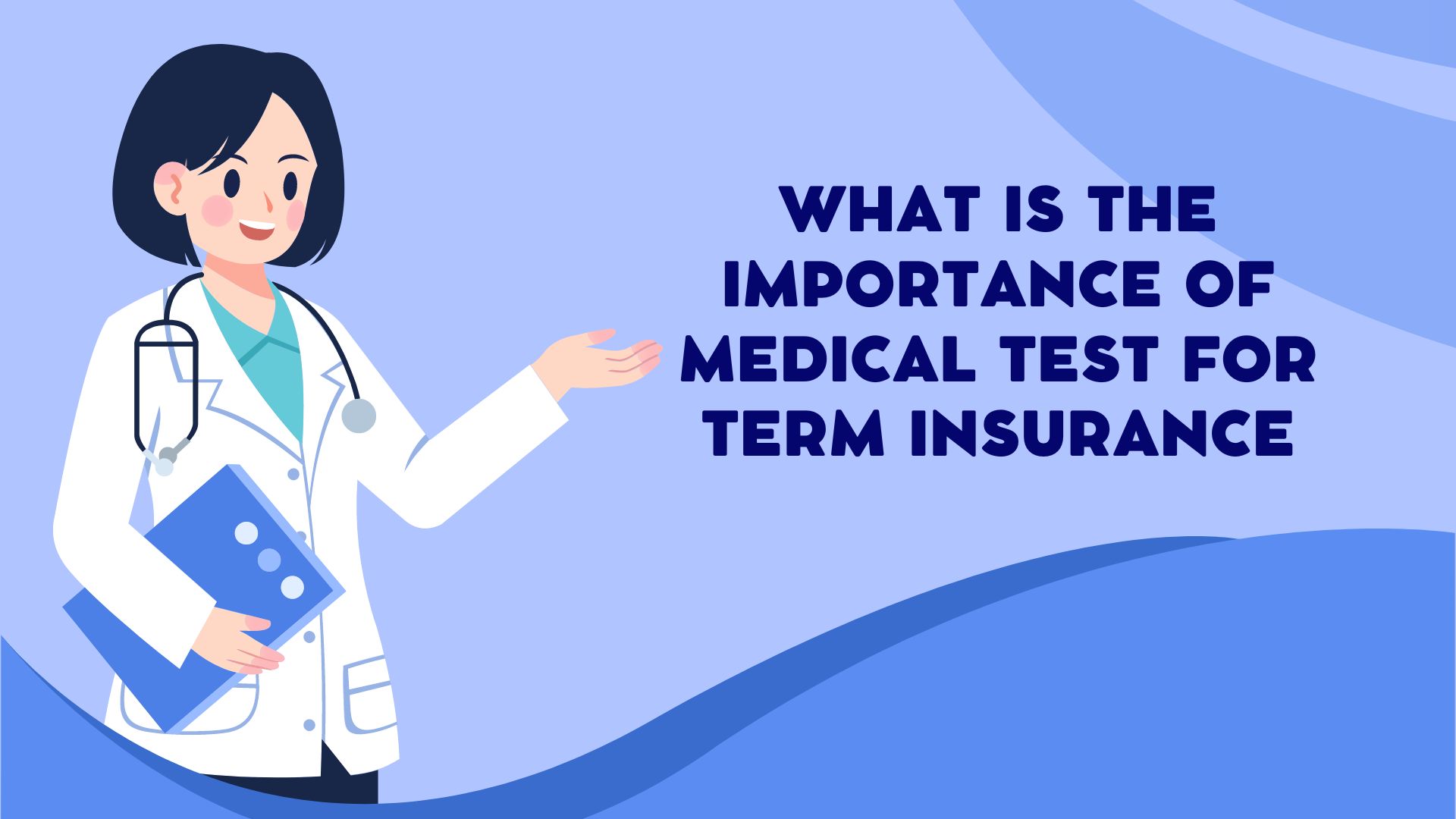Medical tests are crucial for term insurance because they assess your current health status. These tests typically include checks for blood pressure, cholesterol levels, and overall fitness. They help insurance companies determine the risk associated with insuring you. By understanding your health condition through these tests, insurers can offer you appropriate coverage and premiums. This process ensures that you receive fair pricing based on your health, protecting both you and the insurer from unforeseen financial risks in the future.

These tests provide a clear picture of your health and help insurers predict the likelihood of future health issues. If you have pre-existing conditions or high-risk factors, these tests allow the insurer to adjust the coverage or premiums accordingly. This process ensures that the insurance policy is fair for both you and the insurer. By conducting these tests, insurers can offer you a policy that matches your health status, making sure you get the right coverage and preventing unforeseen financial burdens in the future.
Benefits of Medical Tests for Term Insurance
- Accurate Risk Assessment- Medical tests provide insurers with detailed information about your health, helping them assess the risk of insuring you. This ensures that you receive a premium that accurately reflects your health status.
- Fair Premium Rates- By evaluating your health through medical tests, insurers can offer you fair premium rates. If you are in good health, you may receive lower premiums compared to those with health issues.
- Tailored Coverage Options- Medical tests allow insurers to offer coverage options that best suit your health needs. This ensures that you get a policy that meets your specific requirements.
- Early Detection of Health Issues- Some tests may reveal health conditions you were unaware of, allowing you to address them early on. This proactive approach can improve your overall health and potentially lower future insurance costs.
- Transparency and Trust- Medical tests ensure that the insurance process is transparent. Both you and the insurer have a clear understanding of your health status, fostering trust and a fair insurance experience.
Key Features of Medical Tests for Term Insurance
- Health Evaluation- Tests typically include blood pressure checks, cholesterol levels, and blood tests to assess various health aspects.
- Non-Invasive Procedures- Many tests are non-invasive and straightforward, such as blood tests and physical examinations.
- Standardized Testing Procedures- Medical tests follow standardized procedures to ensure consistent and reliable results across different applicants.
- Detailed Health Reports- Tests provide detailed reports on your health condition, which are used to determine your insurance eligibility and premium rates.
- Used for Underwriting Decisions- Test results are a key component in the underwriting process, helping insurers make informed decisions about your policy.
- Baseline Health Information- Tests offer a baseline of your health, which can be useful for future reference or adjustments to your insurance policy.
What are the medical test required for the term insurance?
Medical tests required for term insurance typically include:
- Blood Pressure Measurement: Checks for hypertension or other cardiovascular risks.
- Cholesterol Levels: Evaluates HDL, LDL, and total cholesterol levels to assess heart health.
- Blood Glucose Test: Screens for diabetes or insulin resistance.
- Complete Blood Count (CBC): Checks for anemia and other blood-related conditions.
- Liver and Kidney Function Tests: Assesses organ health and potential risks.
- Urinalysis: Detects kidney problems or diabetes through urine examination.
- Electrocardiogram (ECG): Records heart’s electrical activity to detect heart conditions.
What are the steps for Medical Test for Term Insurance?
| Step | Description |
|---|---|
| Submit Insurance Application | Fill out the insurance application form with personal details and health history. |
| Insurance Company Review | Insurer evaluates your application to decide if medical tests are necessary. |
| Schedule Medical Tests | Follow instructions to book an appointment for required medical tests. |
| Undergo Medical Tests | Visit the medical center for tests such as blood pressure, blood tests, and urinalysis. |
| Submit Test Results | Test results are sent directly to the insurance company for evaluation. |
| Insurer’s Review of Test Results | Insurer reviews results to assess health risks and determine policy terms. |
| Receive Policy Offer | Insurer offers policy terms based on your health evaluation. |
| Review and Accept the Policy | Review the offer and accept it to finalize your term insurance coverage. |
| Policy Issuance | Insurer issues the official insurance policy documents. |
Additional Details
- Pre-Test Instructions: You might receive specific instructions before tests, such as fasting for blood tests.
- Medical Centers: Tests are often conducted at affiliated clinics or hospitals.
- Costs: The cost of medical tests is usually borne by the insurer, but confirm this with your insurance provider.
Conclusion
In conclusion, medical tests are a crucial component of obtaining term insurance as they provide a clear and accurate assessment of your health. By evaluating factors such as blood pressure, cholesterol levels, and glucose levels, these tests help insurers determine the appropriate coverage and premium rates. They ensure that both the insurer and the insured are protected, offering fair pricing based on health conditions. Moreover, medical tests can uncover potential health issues early, allowing for timely intervention. Overall, these tests help establish a transparent, fair, and effective insurance process that benefits both parties in the long term.
Frequently asked questions (FAQs)
1. Why are medical tests required for term insurance?
Medical tests are required for term insurance to assess your overall health and determine the risk associated with insuring you. These tests help insurance companies decide on the appropriate coverage and premium rates based on your health status.
2. What kind of medical tests are typically performed for term insurance?
Common medical tests for term insurance include blood pressure measurements, cholesterol and glucose tests, a complete blood count (CBC), liver and kidney function tests, and urinalysis. These tests help evaluate cardiovascular health, diabetes risk, and organ function.
3. How do medical tests affect my term insurance premium?
Medical tests help insurers gauge your health risks, which directly affects your term insurance premium. If tests show you are in good health, you may receive lower premiums. Conversely, if tests reveal health issues, your premiums might be higher or you may need to adjust your coverage.
4. What are the benefits of undergoing medical tests for term insurance?
Undergoing medical tests for term insurance benefits you by providing a fair premium rate based on your health. It also ensures you receive the right coverage, can detect potential health issues early, and creates a transparent insurance process for both you and the insurer.
Read More:
- Bike Insurance: Premium Details And How To Buy
- How safe private insurance companies are?
- 7 principles of Insurance which every investor should know
- Why should you avail life insurance?

Hello, I am Tanisha Kriplani, graduated in computer science from Delhi University. I am passionate about web content writing and have a strong interest in Data Analytics and Data Engineering.












